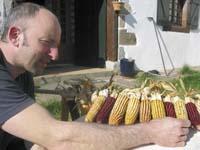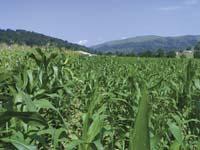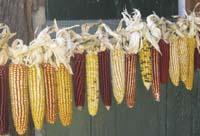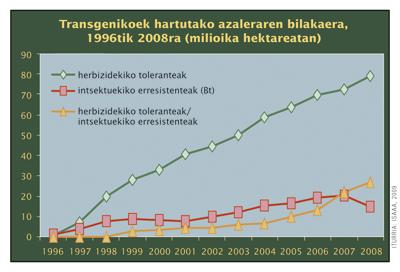Optional

Peasant Jon Harluxet, president of the association Bio-Aquitaine, claims cultivation without GMOs. According to him, GMOs "although mentioned a lot, they are very marginal" in France and the North Basque Country, "and that's better". The planting of GMOs was authorized for two years, but last year the moratorium was restored, so no GMOs were performed. Thus, Harluxet is not directly affected by GMOs.
But that doesn't mean you don't worry. From a purely pragmatic and economic point of view, Harluxet renounces GMOs. He says that "80% of consumers do not want GMOs." It is not against GM technology, but it does not want to impose itself, "and we know that agriculture is not a closed system."
In fact, remember that in the department of Lot-et-Garona appeared transgenic plants in the field of an ecological farmer because of the pollen dragged by the air of some plantation of the area. And when this happened, the planting of GMOs was prohibited. "Although prohibited, there is a risk of contamination; once accepted, I do not contact you." For producers of organic farming it is important to maintain the moratorium on GMOs.

They also have other reasons to quit GMOs. For example, Harluxet separates propaganda and reality for GMOs. According to the propaganda, transgenic seeds will serve to overcome hunger in the world and are a tool to protect the environment, "but 99% of the GMOs that occur in the world have two functions: 66% are programmed for the tolerance of a herbicide, glyphosate, while 33% generate an insecticide toxin - which is the Bt corn, the only one admitted in Europe".
In Harluxet's words, they often start with that corn because "it's easier to explain it to society." And that toxin is also in nature, "so they say it's very natural." However, the most interesting thing is the other, because along with the seed they also sell herbicide.
He believes they are propaganda motives that serve to combat hunger. In fact, most GMOs are made not to feed people, but to feed livestock, fuel cars and make cotton for the textile industry.

Harluxet is clear that there are great economic forces behind GMOs. The large biotechnology companies (Monsanto, Syngenta, Novartis, Bayer, DuPont...) were chemical industries. They were introduced into the agricultural sector selling fertilizers and now they also sell seeds. "In agriculture there is something that cannot be excluded, a seed; and if you control the seed, you control everything."
However, he believes that society wants to control its food. And he believes that what has happened in France is a very representative example: "If the issue is socialized, it is possible for politicians to ban transgenics."
Although in this sense it is quite optimistic, it has more concerns regarding GMOs. One of them is the decline of bees. Bees are disappearing all over the world and Harluxet and so many others feel that Bt corn is involved, including biologists and agronomist engineers.

Bees carry pollen from Bt corn to the coofón, which they use to feed the larvae. Harluxet and others report that no study has been done to see if this has consequences. Moreover, the decline of bees is only one of the negative consequences for the environment of GMOs. Therefore, they demand that research be carried out and "not to take advantage of the environment as if it were a laboratory table".





